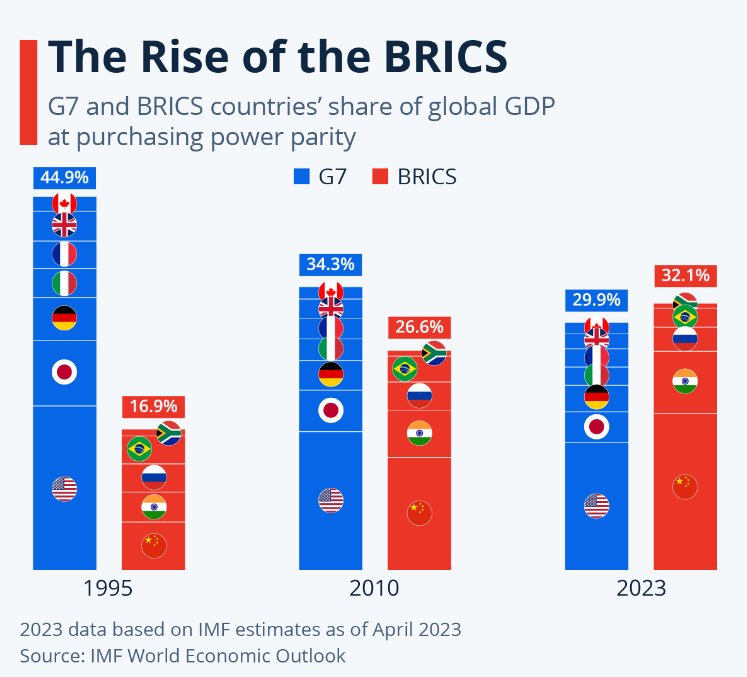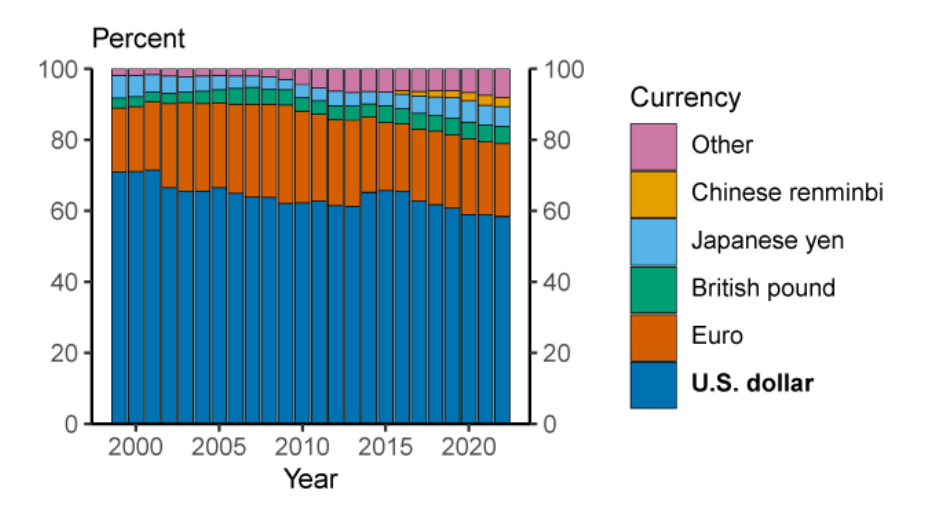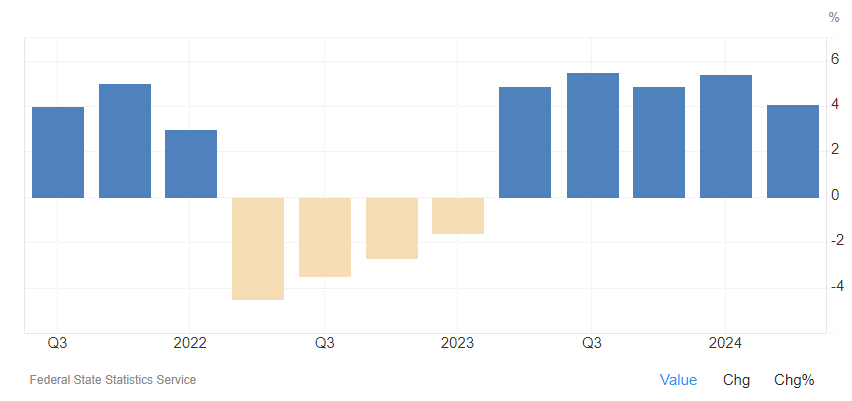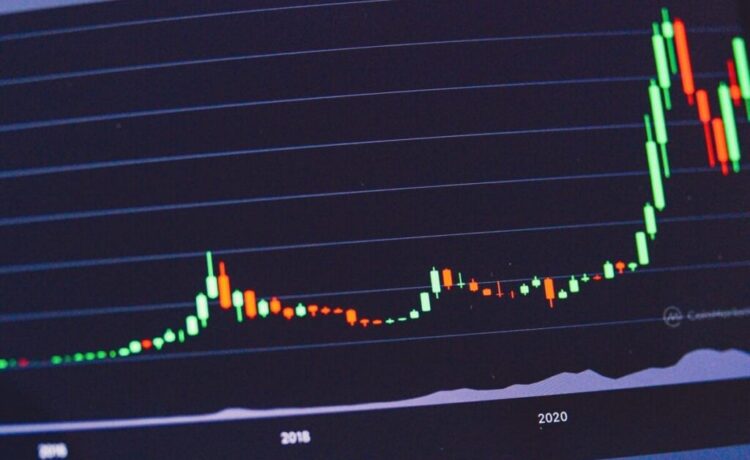Russian President Vladimir Putin’s economic strategy aims to dethrone the US dollar as the world’s foreign currency reserve.
Putin pushed for that goal at the BRICS three-day summit from October 22-24 in the Russian city of Kazan. He called for an alternative international payment system that would prevent the US from using the dollar as a political weapon.
The US and its partners imposed extensive sanctions against the Russian economy in reaction to the invasion of Ukraine in 2022. It also seized about $300 billion in foreign exchange reserves held in the US.
Participants at the BRICS summit voiced concern “about the disruptive effect of unlawful unilateral coercive measures” in a joint declaration on Wednesday. The bloc cited “illegal sanctions on the world economy, international trade, and the achievement of the sustainable development goals.”
China, the world’s second-biggest economy and the largest oil importer, has taken steps to de-dollarize. It launched petroyuan in March 2023 on the Shanghai International Energy Exchange (INE) in a bid replace the petrodollar. Brazilian President Luiz Inácio Lula da Silva has said that the US dollar is harmful to the Global South.
BRICS, comprising Brazil, Russia, India, China and South Africa, expanded from 2009 to date to embrace Iran, Egypt, Ethiopia, the United he United Arab Emirates, and Saudi Arabia. However, Saudi Arabia has not joined the bloc.
BRICS comprises around 28% of global economic production and roughly 45% of the globe’s population.

Rising Purchasing Power of BRICS countries, April 2023, Source: Statista
Europe Worries About Impact Of Seizing Assets
Seizing Russian reserves has raised concerns among European officials. They claimed that this could threaten the US- and European-led global financial system, according to the Brookings Institution.
In a March briefing, the European Union (EU) warned that Iran and Egypt’s membership in BRICS isn’t much of an economic concern. However, it said it does make “the reaching of consensus on common political positions more difficult.”
It also noted that “the expansion should be seen beyond the purely economic effect, in the form of greater influence for the group.” This could potentially undermining the stabilizing Bretton Woods order, it said.
Italy’s central bank governor, Fabio Panetta, said in a speech on January 26 that “weaponizing a currency inevitably reduces its attractiveness and encourages the emergence of alternatives.”
US Dollar 80-Year Run Remains Secure
Putin’s economic strategy to end the dollar’s 80-year run as the global currency of choice may be easier said than done.
“The creation of a BRICS common currency has so far proven to be unrealistic,” Hans-Dieter Holtzmann, a Project Director at the Friedrich Naumann Foundation, wrote on October 21.
That is “due to the very different economic and financial structures and monetary interests of the individual BRICS members,” he wrote.
The dollar comprised 58% of disclosed global official foreign reserves in 2022, a decline from 71% in 2000. This far surpassed all other currencies, including the euro (21%), Japanese yen (6%), British pound (5%), and the Chinese renminbi (3%).

Global foreign exchange reserves, 2022, Source: Federal Reserve
Brookings Institute‘s Douglas A. Rediker argued on Monday that the dollar’s role as ” reserve currency remains relatively stable.”
“Replacing the US dollar requires a credible alternative,” he wrote. “The group’s ambitious goal of ‘de-dollarizing’ the global financial system remains largely rhetorical.”
BRICS Promotes Alternative To IMF
Another of the bloc’s top priorities is the creation of alternatives to the International Monetary Fund (IMF) through the New Development Bank.
“We support further development of the NDB and improvement in corporate governance,” member nations said in the joint declaration. “We support the NDB in continuously expanding local currency financing and strengthening innovation in investment and financing tools.”
The BRICS bank is committed to providing financing in national currencies to countries of the Global South, Dilma Rousseff, the bank’s president, said. Putin, who met with Rousseff in Kazan, praised the bank as a promising and effective financial entity.
But Brookings’ Rediker questioned the bank’s effectiveness.
“For a new BRICS IMF alternative to be established, wealthier BRICS countries would need to be willing to provide funding to a new institution,” he said. “Such intra-BRICS generosity is unlikely.”
Summit Shows Russia’s Global Influence
While it remains unclear whether BRICS can weaken the role of the dollar, Putin promoted the gathering as a show of Moscow’s influence on the world stage.
Russia, a key player within BRICS, has wanted to leverage BRICS against US-led efforts to isolate Moscow and weaken its energy influence. Russia’s economy contracted after its invasion of Ukraine but has since recovered as Putin’s economic strategy realigned the county’s trade relationships.

Russia GDP Annual Growth Rate Recovers, Source: Trading Economics
“Putin got more than he could dream of from the BRICS summit,” Velina Tchakarova, a Geopolitical Strategist, wrote on X. “The attendance of UN SecGen Guterres represents the full capitulation of the old international system, while the new global system struggles to get born.”
The director of the Berlin-based Carnegie Russia Eurasia Center, Alexander Gabuev, highlighted the importance of the optics.
“The BRICS agenda itself is pretty shallow… not that much has been achieved,” he told the New York Times. “But the sheer optics and the picture is important. No.1 for Putin is an opportunity to present Russia as not isolated.”
Ultimately, while Putin’s economic strategy aims to reduce reliance on the dollar, the feasibility of such a shift remains a topic of debate among economists and governments.
Disclaimer
Any opinions expressed in this article are not to be considered investment advice and are solely those of the authors. European Capital Insights is not responsible for any financial decisions made based on the contents of this article. Readers may use this article for information and educational purposes only.
This article is from an unpaid external contributor. It does not represent Benzinga’s reporting and has not been edited for content or accuracy.
© 2024 Benzinga.com. Benzinga does not provide investment advice. All rights reserved.
















